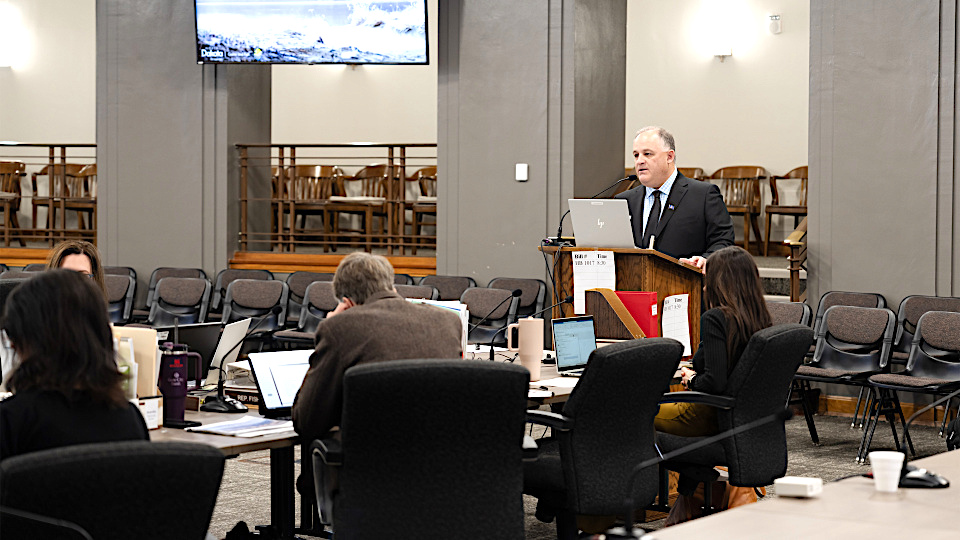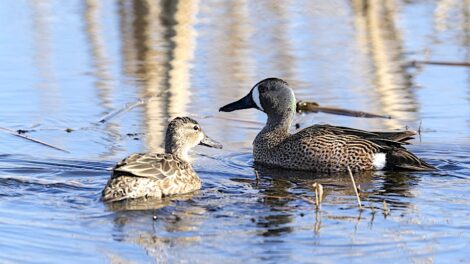North Dakota Outdoors: 2025 outdoors legislation brings new department changes

Submitted Photo Jeb Williams, director of the North Dakota Game and Fish Department, speaks at the North Dakota Legislature. One often overlooked area in North Dakota’s outdoors is the recently completed legislative session. Photo by Ashley Peterson, NDGF.
Many hunters and anglers understand the work of the Game and Fish Department – from game wardens checking hunting and fishing licenses and keeping everyone outdoors safe, to fisheries biologists stocking and surveying lakes, to wildlife biologists and land managers maintaining and enhancing habitat, assessing wildlife populations and setting seasons.
One often overlooked area in North Dakota’s outdoors is the recently completed legislative session. Director Jeb Williams, deputy Director Scott Peterson, along with division chiefs and expert staff worked diligently for the sportsmen and women throughout the legislative session.
As a biologist in the field, it’s interesting to see department leaders confidently testify on issues of significance, such as the social impacts of distributing deer tags or addressing hunter congestion and competition for high interest areas such as badlands mule deer hunting.
While the official session began in early January and came to a close in May, the work began well before with potential legislation and will continue with adjusting to the changes new legislation requires.
The North Dakota Game and Fish Department tracked 20 outdoors-related bills during the 2025 legislative session, 14 passed both chambers and were signed into law. The following bills take effect Aug. 1. A complete list of bills is on the Game and Fish website, gf.nd.gov.
HB 1017 – Appropriates $114,864,690 to the Game and Fish Department for the biennium beginning July 1, 2025, and ending June 30, 2027.
HB 1082 – Defines farmed elk as mammals of the North American elk genus and species (cervus canadensis) confined in a manmade enclosure designed to prevent escape.
HB 1094 – Nonprofit organizations eligible to apply for special allocation big game hunting licenses for fundraising must be exempt from federal income taxation under section 501(c)(3) or 501(c)(19), and must contribute at least 20% of the net proceeds of any raffle of a license to a conservation-related project.
HB 1147 – A resident disabled veteran who has at least a 50% service-connected disability qualifies for the $3 combined general game, habitat, small game and furbearer license.
HB 1174 – The department may establish educational and community outreach programs to promote public understanding of fisheries and wildlife management and promote interest in pursuing careers in fields employed by the department, including by job shadowing of field activities.
HB 1260 – Fifteen percent of the total mule deer gun licenses made available in the current year must be made available as nonresident any-deer bow licenses.
HB 1412 – The director shall provide that each application for a deer lottery license contains the option for an unsuccessful applicant to donate the license fee to the Private Land Open To Sportsmen program.
HB 1470 – Increases the fees of some hunting and fishing licenses, and changes hunting guide and outfitter requirements.
HB 1598 – An individual, while hunting big game or small game, other than waterfowl or cranes, may not use a motor-driven vehicle on any land other than an established road or trail without the written permission of the landowner, unless that individual has reduced a big game animal to possession.
SB 2137 – The department may not adopt a rule or implement a policy prohibiting or restricting the use of supplemental feed on private property for hunting a big game animal. Has a sunset clause of July 31, 2029.
SB 2155 – The number of pronghorn gratis licenses issued may not exceed one-half of any pronghorn licenses available. In addition, if the individual is unsuccessful in the landowner lottery, that application may be included in a lottery for remaining licenses.
SB 2216 – A waterfowl habitat restoration electronic stamp is required for every resident and nonresident to hunt waterfowl at a fee of $5. In addition, creates a waterfowl habitat improvement fund for improving and restoring waterfowl habitat and supporting youth hunting programs.
SB 2245 – Allows the hunting of waterfowl from a floating craft without a motor propelled exclusively by paddle, oars or pole; or with a motor if the craft is at rest and the motor has been turned off.
SB 2309 – Allows the statewide antlerless white-tailed youth deer license to be issued as an antlerless license through governor’s proclamation.
The next legislative session will be held in 2027, and if you have an interest in future legislation, connect with your local senators and representatives to begin forging a relationship and to better understand the process of outdoor legislation.

